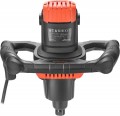Power consumption
The power consumed by the construction mixer (see "Device") during operation.
High power provides the device with high performance — such a model can easily cope with complex tasks, such as mixing a large volume of mixture at a time or while working with heavy fillers, such as crushed stone. On the other hand, high power affects the power consumption of the device, its weight, dimensions and cost. It makes little sense to purchase a powerful model if you select a tool for domestic use from time to time.
Rotation speed
The rotation speed of the nozzle or mixing container provided by a plaster mixers.
High rotation speed devices work best with paints, varnishes and glues.
Low rotation speed models do a good job of preparing thick mixtures. Many modern plaster mixers and mixer-drills support the ability to adjust the speed (see "Features"), which allows user to choose the most optimal mode for a particular mixture. Powerful tools especially need a rotation under heavy load support system.
Max. mixing paddle diameter
The vast majority of attachments for construction mixers have a standard size in length, usually 600 mm. But their diameter may differ, its maximum size is limited by the manufacturer, which must be considered when choosing. The indicator depends on the technical characteristics of the tool. The most popular sizes are
120mm,
140mm and
160mm nozzles. The larger the diameter of the auger, the easier it can cope with a large volume of mixed mixture.
Reduction drive
The ability to switch speeds allows you to cope with various types of tasks: low speed and high torque are perfect for mixing viscous or heavy mixtures, and vice versa — high speed and low torque are better to cope with liquid materials such as paint, glue, etc.
Note that the support for
two speeds provides the presence of a two-speed gearbox. At the same time, many modern construction mixers with a single-speed gearbox support the ability to smoothly adjust the speed of rotation of the nozzle (see "Functions / Capabilities").
Max. stirred volume
Numerical value, expressed in liters, indicating the maximum volume of solution that the mixer can mix in one step.
Functions
—
Soft start. This function allows you to avoid a sharp start of the engine at the beginning of work, which, on the one hand, allows you to avoid overloads on the power supply network, and on the other hand, splashing of building mixtures.
—
Speed controller. The ability to adjust the speed of rotation of the nozzle of the working tool will be very useful for working with mixtures of different consistency. As you know, for effective mixing of liquid materials, a high speed is required, and for viscous materials, a lower speed, but a higher torque.
—
Maintain momentum. With the help of special sensors, the speed control system monitors changes in load and, depending on this, increases or decreases the speed of the nozzle, thus maintaining the speed set by the user, regardless of the load. This ensures more efficient and better mixing and extends the life of the device.
—
Power button lock. Locking the power button when the tool is off allows you to avoid accidental start in abnormal mode, which increases the safety of the device. And vice versa: locking when the tool is on eliminates the need to constantly keep your finger on the power button, which is very convenient, especially during long work.
—
Electronic engine protection. The system provides automatic shut
...down of the engine in case of overheating, jamming of the nozzle, or simply in case of a critical increase in load, which helps to avoid tool failure and extend its service life.
— Brushless motor. The presence of a brushless (brushless) motor in an electric tool. Such motors are noticeably superior to traditional collector motors in terms of efficiency, which can significantly reduce energy consumption without sacrificing power; this is especially important for cordless tools (see "Power Source"), where this feature is predominantly found. In addition, brushless motors are quieter and produce virtually no sparks during operation, making them perfect for working in high fire hazard environments. Their main disadvantages are traditional — the complexity of the design and high price.
